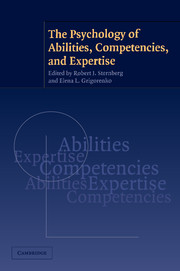Book contents
- Frontmatter
- Contents
- Preface
- List of Contributors
- The Psychology of Abilities, Competencies, and Expertise
- 1 Trait Complexes, Cognitive Investment, and Domain Knowledge
- 2 Intelligence as Adaptive Resource Development and Resource Allocation: A New Look Through the Lenses of SOC and Expertise
- 3 Developing Childhood Proclivities into Adult Competencies: The Overlooked Multiplier Effect
- 4 The Search for General Abilities and Basic Capacities: Theoretical Implications from the Modifiability and Complexity of Mechanisms Mediating Expert Performance
- 5 On Abilities and Domains
- 6 Expertise and Mental Disabilities: Bridging the Unbridgeable?
- 7 The Early Progress of Able Young Musicians
- 8 Expertise, Competence, and Creative Ability: The Perplexing Complexities
- 9 Biological Intelligence
- 10 What Causes Individual Differences in Cognitive Performance?
- Index
- References
6 - Expertise and Mental Disabilities: Bridging the Unbridgeable?
Published online by Cambridge University Press: 05 June 2012
- Frontmatter
- Contents
- Preface
- List of Contributors
- The Psychology of Abilities, Competencies, and Expertise
- 1 Trait Complexes, Cognitive Investment, and Domain Knowledge
- 2 Intelligence as Adaptive Resource Development and Resource Allocation: A New Look Through the Lenses of SOC and Expertise
- 3 Developing Childhood Proclivities into Adult Competencies: The Overlooked Multiplier Effect
- 4 The Search for General Abilities and Basic Capacities: Theoretical Implications from the Modifiability and Complexity of Mechanisms Mediating Expert Performance
- 5 On Abilities and Domains
- 6 Expertise and Mental Disabilities: Bridging the Unbridgeable?
- 7 The Early Progress of Able Young Musicians
- 8 Expertise, Competence, and Creative Ability: The Perplexing Complexities
- 9 Biological Intelligence
- 10 What Causes Individual Differences in Cognitive Performance?
- Index
- References
Summary
Jean-Baptiste Grenouille, the main character of Patrick Süskind's Perfume, was an expert perfumer. His knowledge of aromas, his ability to differentiate, dissect, mix, and create various smells gave him a craft and made other people adore and hate him. And yet, from the very beginning of the book, it is clear that Grenouille was not a “typical” individual: His language development was delayed, his cognitive abilities were challenged, and his motor functioning appeared to be impaired. Yet he was a true expert of smell – he knew how to imitate the perfume of a blossom, the smell of a dog, various human odors, and even the aromas of those rare humans who inspire love. His skill was recognized and admired, and Grenouille kept developing and strengthening it.
The example of Grenouille poses an interesting question – can it really be that a person is simultaneously an expert in one domain and mentally handicapped in other domains? In broader terms, is it possible for mental disability and expert knowledge to coincide? To answer this question, I first cite and discuss various definitions of the word expertise. Second, I briefly review the literature on expertise. Third, I present a hypothesis suggesting the coexistence of expertise and disability, and support this model with a number of cases from the literature. Finally, I explore the application of this hypothesis to studies of the etiology of expertise.
- Type
- Chapter
- Information
- The Psychology of Abilities, Competencies, and Expertise , pp. 156 - 185Publisher: Cambridge University PressPrint publication year: 2003
References
- 3
- Cited by



